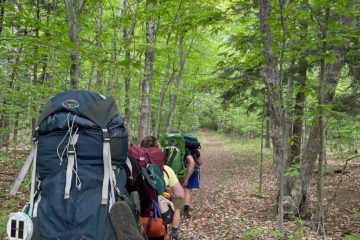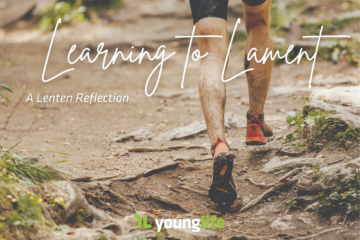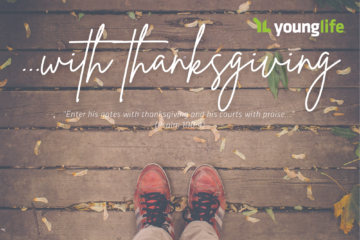A guest post by Josiah Huisman, Middle School Youth Director & Young Life Church Partner at First Reformed Church in Zeeland, MI. Originally posted here and shared with permission.
“O comfort my people, says your God, speak tenderly, that her penalty is paid… in the wilderness prepare the way.” (Isaiah 40)
We live in the wilderness.
It’s a painful world, our current moment is filled with grief, loss, struggle, anxiety and depression… We live in the wilderness. My father recently told me he believes the vast majority of the population is under a mild depression, whether they are aware of it or not. I tend to agree.
We’ve been gritting our teeth to get through the pandemic, hoping for an end.
How much longer can we grit our teeth? And to what end? Will there be an end, and how do we get there? Both literally and metaphorically, how do we get through winter? Pick your emotional narcotic of choice, anger, sadness, anxiety, complaining, blame shifting, or a life of bliss by ignorance. Those all will work for a time, and can even be understood in such a stressful season. But they aren’t sustainable emotions for a long term climate.
How then, do we make it through, especially when it’s hard to see an end?
I would summit that there is not only an end, but a path of flourishing while we get there.
Victor Frankl was an Austrian psychologist who lived through the second world war and endured the hell that was Auschwitz. In his book “Man’s search for Meaning” he makes the observation that those who survived the German concentration camp and sometimes were even happy while there, were not the strongest, smartest, or most healthy, but rather those who found meaning in their suffering. Those who had a conviction to live for something outside of themselves. Frankl later wrote about the world after the war “Ever more people today have the means to live, but no meaning to live for.“
It seems to be a commentary on the importance of meaning in our lives as people, the core of what drives us.
The world calls this “meaning”, biblical language calls this faith.
The reason meaning or faith drives us as people, in spite of all hardship, is that it’s rooted outside of ourselves, in something greater, worth striving for and therefore breeds hope. Hope of an existential sort.
The problem today is that the secular western narrative is hemorrhaging a biblical understanding of faith and hope from its system of understanding.
Instead of what we would call a discovered faith, in a singular eternal truth, secularism has crafted what physiologists refer to as a developed meaning, whether it’s our careers, activism movement, hobby, social circle or political party. It’s where we find meaning in something fragile, temporary and shifting.
Secondly, in regards to hope, western culture has shifted from hope in God from its founding, to hope in nation in its core development, and now finally to hope in self actualization.
Tim Keller writes “Our hope is now for individual freedom to pursue our own private ideas of good and discover our authentic selves”
The great trouble with that narrative in a pandemic world, is that our self centered developed meanings, and our individualistic views of hope, are stripped away quickly with government shutdowns, restrictions, political power shifts, loss of work, the risk of sickness or even death.
It then is no wonder why we feel and see so much pain, unrest, stress, depression, restlessness, anxiety, and grief, why we just want to call it quits in 2020 and start over. In that framework there is no hope in the future.
We need to have faith in something bigger than ourselves. We need to have hope for the future.
John Mark Comer says “We have to actually have hope, a conviction of coming good based on reality, not on wishful thinking. We are hope based creatures, we simply cannot live inside a meaningless, incoherent, random chance universe, free floating from one experience to the next run by the desire to feel good in the moment until we die. We simply can’t live that way.”
In a pandemic world a false sense of faith, and a false sense of hope simply won’t cut it, we simply can’t live that way.
This is why friends, as we rest on the dawn of advent, we remember why Christmas is such good news. We have faith in the creator God, Hope in the Son who came to save the world, and by the Spirit we will become love.
System theorists would say that the relationship between faith, hope and love are interdependent on one another, you must have them all to have one.
Paul illuminated this paradigm long before system theory existed when he said “Now these three remain, faith, hope and love but the greatest of these is love” 1 Corinthians 13
As many spiritual stage theorists would say, “the end of the journey is love”. It is where we are heading as followers of Jesus. We get there through faith and by hope.
So friends, this advent season, in a pandemic world, let us reflect on the good news of Jesus. That the Lord God creator, who is in Himself Love, became incarnate for the salvation of the world.
Became vulnerable, in the person of Jesus Christ. Entered into the brokenness of the world, so that He may reconcile all things to himself.
In this pandemic world, where we cannot have faith in the world, let us have faith in our God. Where we cannot have hope in ourselves, let us Hope in Jesus. So that we may become love, and participate in the beautiful dance of reconciliation taking place amongst us.
It is our participation in this dance that motivates us to keep going through this season. I’ve heard some who want to call it a year. Others have said that this year has been a waste. Take heart friends, the end of advent holds a truth so beautiful, that reminds there’s something far bigger than this world to have faith in, to hope in, that motivates us to become love for the sake of the world.
Advent is a season of hopeful waiting, from a place of darkness, we long for saving truth to be birthed into the world. This year now more than ever, we long for that saving truth. From the darkness, the hope of Jesus will drive us. Following Him we become love.
Let us reflect in this advent season, reflect on the hope we find in the word became flesh, and in Him is light, and that light is our life. The light that far outweighs the darkness of our world, of the pandemic, the light that gives us hope.
We will get to the end of this pandemic, with faith, pulled by hope, flourishing by love.
The end is love.
“the birth of of Jesus the Messiah took place in this way, an angel of the Lord appeared to Joseph in a dream and said, “Do not be afraid to take Mary as your wife, for the child conceived in her is of the Holy Spirit, she will bear a son, and he will save the people from their sins.” This fulfilled what had been spoken by the prophet, the virgin shall conceive and bear a son… and they shall call him Emmanuel, which means “God with Us”. (Matthew 1)
Featured photo credit: Nate Foster [Firestorm Photography]


